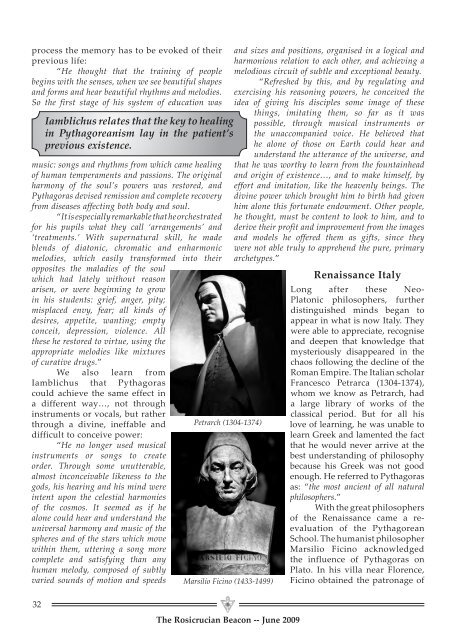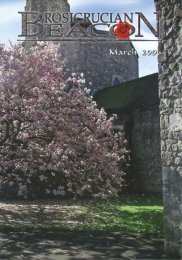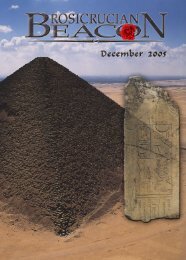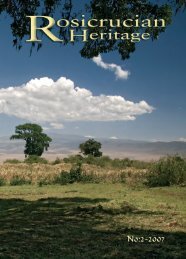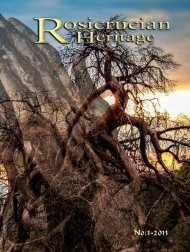RosicRucian - AMORC
RosicRucian - AMORC
RosicRucian - AMORC
- No tags were found...
Create successful ePaper yourself
Turn your PDF publications into a flip-book with our unique Google optimized e-Paper software.
process the memory has to be evoked of theirprevious life:“He thought that the training of peoplebegins with the senses, when we see beautiful shapesand forms and hear beautiful rhythms and melodies.So the first stage of his system of education wasIamblichus relates that the key to healingin Pythagoreanism lay in the patient’sprevious existence.music: songs and rhythms from which came healingof human temperaments and passions. The originalharmony of the soul’s powers was restored, andPythagoras devised remission and complete recoveryfrom diseases affecting both body and soul.“It is especially remarkable that he orchestratedfor his pupils what they call ‘arrangements’ and‘treatments.’ With supernatural skill, he madeblends of diatonic, chromatic and enharmonicmelodies, which easily transformed into theiropposites the maladies of the soulwhich had lately without reasonarisen, or were beginning to growin his students: grief, anger, pity;misplaced envy, fear; all kinds ofdesires, appetite, wanting; emptyconceit, depression, violence. Allthese he restored to virtue, using theappropriate melodies like mixturesof curative drugs.”We also learn fromIamblichus that Pythagorascould achieve the same effect ina different way…, not throughinstruments or vocals, but ratherthrough a divine, ineffable anddifficult to conceive power:“He no longer used musicalinstruments or songs to createorder. Through some unutterable,almost inconceivable likeness to thegods, his hearing and his mind wereintent upon the celestial harmoniesof the cosmos. It seemed as if healone could hear and understand theuniversal harmony and music of thespheres and of the stars which movewithin them, uttering a song morecomplete and satisfying than anyhuman melody, composed of subtlyvaried sounds of motion and speedsPetrarch (1304-1374)Marsilio Ficino (1433-1499)and sizes and positions, organised in a logical andharmonious relation to each other, and achieving amelodious circuit of subtle and exceptional beauty.“Refreshed by this, and by regulating andexercising his reasoning powers, he conceived theidea of giving his disciples some image of thesethings, imitating them, so far as it waspossible, through musical instruments orthe unaccompanied voice. He believed thathe alone of those on Earth could hear andunderstand the utterance of the universe, andthat he was worthy to learn from the fountainheadand origin of existence…, and to make himself, byeffort and imitation, like the heavenly beings. Thedivine power which brought him to birth had givenhim alone this fortunate endowment. Other people,he thought, must be content to look to him, and toderive their profit and improvement from the imagesand models he offered them as gifts, since theywere not able truly to apprehend the pure, primaryarchetypes.”Renaissance ItalyLong after these Neo-Platonic philosophers, furtherdistinguished minds began toappear in what is now Italy. Theywere able to appreciate, recogniseand deepen that knowledge thatmysteriously disappeared in thechaos following the decline of theRoman Empire. The Italian scholarFrancesco Petrarca (1304-1374),whom we know as Petrarch, hada large library of works of theclassical period. But for all hislove of learning, he was unable tolearn Greek and lamented the factthat he would never arrive at thebest understanding of philosophybecause his Greek was not goodenough. He referred to Pythagorasas: “the most ancient of all naturalphilosophers.”With the great philosophersof the Renaissance came a reevaluationof the PythagoreanSchool. The humanist philosopherMarsilio Ficino acknowledgedthe influence of Pythagoras onPlato. In his villa near Florence,Ficino obtained the patronage of32The Rosicrucian Beacon -- June 2009


